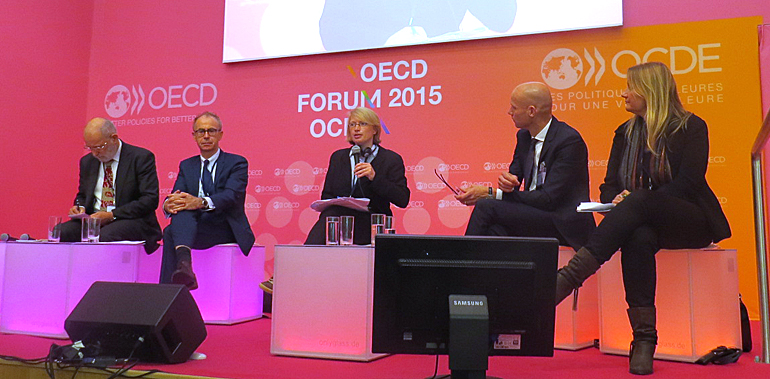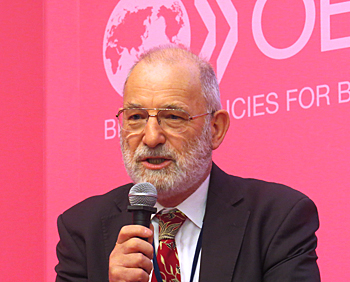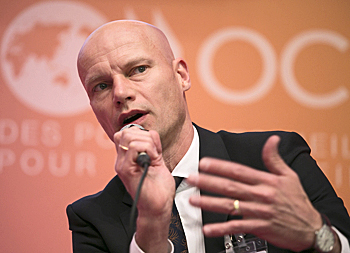OECD forum 2015: Valuing water must include impact of water use
 The true cost of water use is not restricted to delivering a cubic meter of drinking water. Considering the water scarcity in the world, it is a strange phenomenon that water tariffs are based on the delivery of volumes, remarked Jack Moss of Aquafed at a session on the valuing of water during the OECD 2015 Forum in Paris on 3 June.
The true cost of water use is not restricted to delivering a cubic meter of drinking water. Considering the water scarcity in the world, it is a strange phenomenon that water tariffs are based on the delivery of volumes, remarked Jack Moss of Aquafed at a session on the valuing of water during the OECD 2015 Forum in Paris on 3 June.
Jack Moss is president of Aquafed, an international federation of private water operators. He shared his ideas on how water can be better valued, both in the sense of appreciation as well as allocating all costs.
Dutch special water envoy Henk Ovink also participated in the session and he advocated to broaden the scope and take the perspective of water risks and all its – possible - impacts.
The OECD 2015 Forum is held simultaneously with the annual ministerial council meeting of the OECD. This year the council meeting is chaired by Dutch prime-minister Mark Rutte. As a result the forum includes many Dutch speakers and has some sessions on water issues.
 Discussion is muddling
Discussion is muddling
According to Jack Moss the discussion on the correct price for water is muddling because it is not always clear what is meant by valuing. “Is it about valuing in a non-financial sense, as a perception? Or is it about tariffs or about costs? Most of the time the discussions are in fact about the true pricing of the water supply as a service.”
To Moss cost recovery is important to make water supply last. However this contradicts with charging very poor people for their drinking water. “The costs must be as low as possible but and the same time all costs must be recovered. It is this balance that makes a service valuable”, Moss explained.
 From a risk perspective
From a risk perspective
Too much water, too little water and too polluted water. "This is what worried world leaders earlier this year at the Global Economic Forum", reminded special Dutch water envoy Henk Ovink the audience. "Water was considered the number one threat to the world for the next decade. We have to connect safety and scarcity, while urbanisation and climate change is going on. This is very complex and not about finance only".
Ovink suggested to widen the perspective to water risks. "So it also includes the impact of water use. This makes it more comprehensive." Ovink is not aversive of complexity and in fact advocates to embrace it. "It is about connectiveness. About how to communicate with voters and businesses. Let water experts come off the stage and go to the lake".
Eventually local talent will drive the change, said Ovink.
Read also on this website
● OECD meeting 2015: Final statement backs principles on water governance, 5 June 2015
● OECD forum 2015: Dutch minister Schultz calls for political will to solve global water problems, 4 June 2015
● OECD forum 2015: Let citizens do the water management, 4 June 2015
● OECD forum 2015: drawing attention to sustainable urban deltas, 3 June 2015



